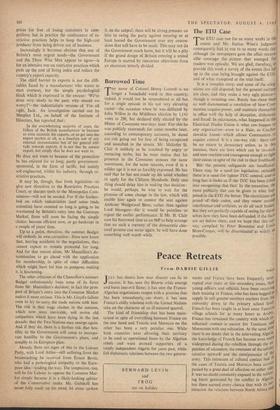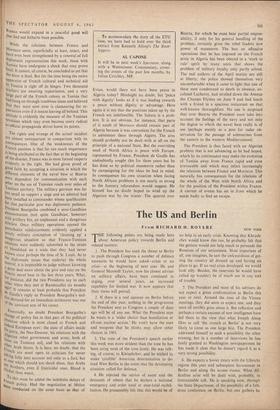Peace Retreats
From DARSIE GILLIE prow; July has shown how near disaster can lie to J success. It has seen the Bizerta crisis emerge and burst into evil flame; it has seen the Franco- Algerian negotiations reopen with a promise that has been immediately cut short; it has seen France's chilly relations with the United Nations take on the character of an ill-natured quarrel.
The kind of friendship that has been main- tained in spite of everything between France on the one hand and Tunisia. and Morocco on the other has been a very peculiar one. While both countries were allowing their territory to be used as-operational bases by the Algerian rebels and were avowed supporters of a totally independent Algeria for years past, while full diplomatic relations between the two govern- ments and France have been frequently interl rupted over more or less secondary issues, theg young officers and officials have been receiving their training in France, who has been begged t° supply in still greater numbers teachers from the university down to the primary school level' French has been taught in at least some Tunisia° village schools for as many hours as Arabic' France has remained the country with which la: tellectual contact is easiest for Tunisians arle Moroccans with any education. At the same time there is no doubt that in the intervening Algeria, .the knowledge of French has become even mor°, widespread during the rebellion through the eit", pansion of education, the extension of the admit; istrative network and the omnipresence of thj army. This extension of cultural contact had i" the cases of Tunisia and Morocco been acconl panied by a great deal of affection on either side', It was no doubt constantly exposed to the wittier' ing blasts generated by the conflict in Alger° but there seemed every chance that with its ter," mination the relations between North Africa and France would expand in a peaceful good will that had not hitherto been possible.
While the relations between France and Morocco seem, superficially at least, intact, and have even been strengthened by a renewal of full diplomatic representation this week, those with Tunisia have undergone a shock that may prove fatal. It cannot, of course, be concluded as yet that the blow is final. But for the time being the entire apparatus of French cultural and technical aid to Tunisia is right off its hinges. Two thousand teachers are awaiting repatriation, and a very large part of the French colony in Tunisia that had hung on through troublous times and believed that they were now over is clamouring for re- patriation even if it means leaving all behind. This attitude is evidently the measure of the Tunisian revulsion which may even become more radical as official propaganda drives home its points.
The rights and wrongs of the actual incident are almost unimportant in comparison with its consequences. One of the weaknesses of the French position is that far too much importance is being attributed to the fact that at the beginning 0f the disaster, France was in most formal respects evidently in the right. She had given proof of good faith by accepting a situation in which the different elements of the naval base at Bizerta were dependent for communication with each other on the use of Tunisian roads over miles of Tunisian territory. The military garrison was far too small to support a siege and an admiral had been installed as commander whose qualification for that particular post was diplomatic patience. I resident Bourguiba combined a semi-Gandhian demonstration (not quite Gandhian, however) with artillery fire, an unpleasant and a dangerous mixture. Once military operations opened the Parachutist reinforcements evidently applied a Purely military conception of 'cleaning up' a dangerous situation so that Franco-Tunisian relations were suddenly submitted to the strain t\LI, bloodshed on a scale that they had never ,,nnwn since perhaps the time of St. Louis. As to the diplomatic issues that underlay the whole quarrel, it is impossible to judge without knowing .great deal more about the give and take on the rthzerta naval base in the last three years. What, lOr instance, did the two Presidents say to each .`)ther when they met at Rambouillet six months ago? It remains at least probable that President t'il oe Gaulle's reply to President Bourguiba's sud- : demand for an immediate settlement was one the unwisest acts of his career.
I ssentially, no doubt President Bourguiba's :hanCe of policy lies in that part of his political situation which is most closed to French and ;111.deed European eyes: the state of affairs inside Al Party, the Neo-Destour, his relations with the them rebel government and army, both of h e111 on Tunisian soil, and his relations with Frenchtaking are most open to criticism for never :king fully into account not only as a fact, but 4,S "e which should not shock them, that Arabs th'e. brothers, even if fratricidal ones. Blood is leker than water, To this must be added the indefinite delays of b:ctleh policy. Had the negotiation at Melun 'en Conducted on the same basis as that of Evian, would there not have been peace in Algeria today? Hindsight no doubt, but 'peace with dignity' looks as if it was leading towards a peace without dignity or advantage. Here again it is not that the positions taken up by the French are indefensible, The Sahara is a prob- lem. It is not obvious, for instance, that parts of it south of Morocco should remain part of Algeria because it was convenient for the French to administer them through Algiers. The area should probably not be dealt with at all on the principle of a national State. But the overriding need of North Africa is peace with Europe, represented by France. President de Gaulle has undoubtedly sought this for three years but he has done so by political manoeuvre rather than by campaigning for the ideas he had in mind. In consequence his own situation when facing North African problems is not nearly as strong as the January referendum would suggest. He himself has no doubt hoped to wind up the Algerian war by the winter. The quarrel over Bizerta, for which he must bear partial respon- sibility, if only for his general handling of the problem, certainly gives the rebel leaders new power of manoeuvre. The ban on offensive operations that he has imposed on the French army in Algeria has been obeyed in a 'work to rule' spirit by many units that shows the problem of military loyalty only partly solved. The real authors of the April mutiny are still at liberty; the police showed themselves very uncomfortable when it came to light that one of these men condemned to death in absence, ex- colonel Lacheroy, had strolled down the Avenue des Champs Elysdes on June 9 and had lunch with a friend in a spacious restaurant on that, well-known thoroughfare. No one is surprised that over Bizerta the President must take into account the feelings of the navy and not only the degree to which the naval base really is of use (perhaps mainly as a post for radar ob- servation for the passage of submarines from the eastern to the western Mediterranean).
The President is thus faced with an Algerian problem that is not advancing as he had hoped, which by its continuance may make the evolution of Tunisia away from France rapid and even irrevocable and which may infect increasingly the relations between France and Morocco. This naturally has consequences for the relations of the whole of the West with North Africa and for the position of the President within France. A current of events has set in from which he needs badly to find an escape.



































 Previous page
Previous page